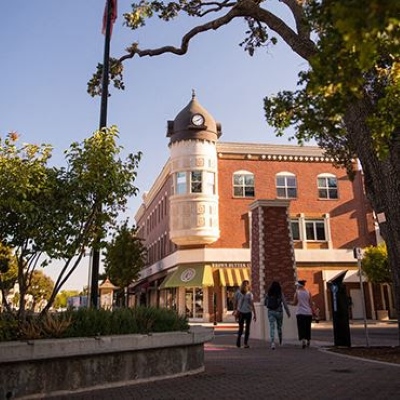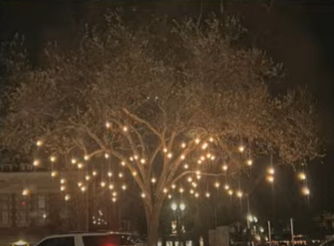City councilmembers pass paid parking ordinance in split vote
Second reading of ordinance held at Tuesday night meeting
– At the Tuesday night Paso Robles City Council Meeting, the council voted three to two to adopt an updated and revised ordinance amending the Paso Robles Municipal Code to set parking rates and reestablish the downtown parking zone. Councilmembers Fred Strong and Chris Bausch were the dissenting votes. Councilmembers Steve Gregory and Sharon Roden as well as Mayor John Hamon voted in favor. This was the second reading of the ordinance.
The program will be priced at $1 per hour within the defined downtown parking zone. There is one free thirty-minute spot on every block face. Paid parking is expected to resume on April 5. Click here to view more information on the program.
Any change to the downtown parking program would require an amendment to the ordinance.
The differences between the first reading of the ordinance and last night’s second reading were that city staff deleted wording about returning to the same parking spot on the same day, and it also changed what City Attorney Elizabeth Hull called a “typo” saying that the maximum parking time would be 10 hours when it was meant to be 11, from 8 a.m. to 9 p.m.
The council also voted four to one to adopt a resolution reauthorizing preferential parking for resident seniors and offering credits or reimbursements to eligible seniors who purchased a parking permit last year. Councilmember Bausch was the lone dissenting vote.
Seniors eligible for the senior permit are:
- 65 or older
- A resident of the city
The permit is limited to one vehicle per household.
The permits are available for seniors who live within the city limits. It was asked if the permits could include those who live outside of city limits. Hull said that if the council wished to do this they could consider an amendment, but that it would “become more complicated,” and the council would have to establish that the zones they would include aren’t arbitrary, discriminatory, etc.
Seniors who purchased permits from last year will be refunded, and there are multiple ways in which this can be accomplished. Seniors can request a credit from last year and not have to pay for this year if they are filing a new application, or if they don’t sign up for a permit they will be automatically refunded at the end of April. A check will be sent in the mail. Or they can go through the refund process through the online form.
It was asked why the senior parking permits could be automatically refunded, whereas just parking fees collected and tickets issued could not be, and it was explained that in the case of the senior parking permits, addresses were collected by the city and not through a third party.
Councilmember Bausch asked again why the refund period had to be only 12 months and not go back further. Hull said that the government code provides that if you are charged a fee, incur a cost, or have damage from a public agency, you have 12 months from the date of the injury to file a claim.
She said that the waivers required for the refunds will also add a layer of protection for the city. She said that the waiver would work “like a class action lawsuit,” where you would waive your right to sue when you fill it out and cash the check. The waiver would not completely prevent someone from suing the city, however, it would be “limiting exposure.”
Councilmember Bausch asked to clarify, “We are protecting the city from an action, an alleged illegal action, we are trying to protect the city from repercussions of those actions? and said, “I just find that disingenuous.”
City Manager Ty Lewis responded by saying Bausch’s points are “all super valid” but that staff has provided all of the information to the councilmembers, and that staff and the council weren’t being disingenuous they were following direction from the legal council and made a decision based on that information.
Councilmember Fred Strong asked to clarify, “Does the one-year time limit also apply to tickets that were illegally issued?” To which Hull responded “Yes.” “So you can collect illegal fees and not have to refund them,” said Strong.
Bausch said that “if the board so chooses, the board could go back beyond the 12 months.” Hull said, “We’re not revisiting the decision that was made on the 20th,” and that the idea of going back further than 12 months was “not on the agenda.” Lewis said that doing so would be a violation of the Brown Act.
“Parts of this ordinance I find totally objectionable,” said Strong. Strong asked if the program was going against a state code that says physical payment options are required for parking programs. Hull said that physical payment does include credit or debit cards. Nonphysical payment would mean the app. “I think it’s very confusing,” said Strong. “Currently this is not a good ordinance the way it’s written.”
Mayor John Hamon said that he was, “Happy with the way things are set, can always adjust as we move forward… We need a parking program and we need to give this a chance.”
“For the record, I don’t like paid parking either,” said Hamon. But he pointed out that the program is not targeting private parking spots, the spots are public property. A program like this is the only legal way to regulate how long people spend in the spots and to require turnover. He also said that the parking district is not that large and that there would still be a lot of spots outside of it. He said that two free hours “is nice but it didn’t cover the cost of the program.” Instead, this cost would come from the general fund, “on the backs of everyone.” He suggested that they bring back the whole system again if approved and look to improve it. “It’s a work in progress,” he said.
Bausch said to “hit the pause button,” and explore the idea of the city building a parking structure and to consider a timed parking program instead because of the “acrimony it is generating.”
Strong said that he had to vote no because less than one percent of his constituents in his district approved of the program of the hundreds that he talked to about it.
Many public comments were made about the program, both for and against. Those for the ordinance felt that it was necessary to control the turnover for the spots, whereas others believe that it will cause a decline in visitors downtown.
A motion was made to pass the ordinance, which was interrupted by a motion from Bausch to table the decision. Bausch’s motion failed. The vote returned to the initial motion to pass the ordinance which passed three to two.
In other actions, the council held a public hearing on an ordinance amending the municipal code regarding permits required for sidewalk vendors to get the code in compliance with recently passed state law. The motion to accept the amendment was passed unanimously.
Council approves year-round downtown park lighting
The council also approved unanimously a resolution authorizing an agreement with L.A. Christmas Light Installers to install year-round decorative lighting in the downtown city park.
The display will include lights in 21 trees (about 1/4 of the trees in the park), with a focus on the heritage oaks that line the pathways and the corners of the park. The installation will be a one-time cost of $115,965 and can be installed by April 19. The vendor, L.A. Christmas Light Installers, will replace the lights with the Christmas light display annually and then switch it back for no additional cost. The display will include “readily available bulbs,” which will be easy for city staff to replace. The cost will be paid for from general fund reserves.
The council also unanimously approved the 2024 Community Development Block Grant Program and final annual action plan and accepted a status report from the Planning Commission Ad Hoc Committee regarding the future development plans for the Paso Robles Street corridor.
Mayor John Hamon also appointed Councilmember Sharon Roden to serve on the city’s FBO Proposal Ad Hoc Committee. Hamon was initially a member of the ad hoc committee but stepped down because of concerns about a potential conflict of interest due to his leasing property at the airport.
A fixed-base operator (FBO) is an organization granted the right by an airport to operate at the airport and provide aeronautical services such as fueling, hangaring, tie-down and parking, aircraft rental, aircraft maintenance, flight instruction, and similar services.
The meeting also included a proclamation in honor of the late mayor Steve Martin, as well as a capital projects update from Ditas Esperanza, and a presentation from David Mullinax from the League of California Cities regarding the Taxpayer Protection Act which he says is a “bait and switch” act that would allow big corporations to carve out more tax exemptions.
The consent agenda included parking lot lighting updates, as well as the approval of a public art installation by local artist Dale Evers. The council passed the consent agenda items unanimously.
Click here to view the meeting agenda.
Watch the meeting on YouTube below:
Related: City Council votes to reinstate paid downtown parking






















